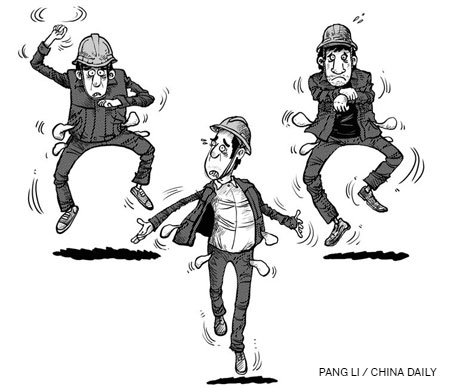
 |
A new but sad story is unfolding across China. With Spring Festival approaching, migrant workers have taken to the performing arts - not for recreation but for getting their dues. In Wuhan, Hubei province, several migrant workers performed Gangnam Style dance to demand their salaries. In Xi'an, Shaanxi province, they dressed up as ancient officials to seek their collective dues of about 4 million yuan ($642,764).
Migrant workers are resorting to such methods also because society, in general, has become insensitive to the rising number of cases of their fellow workers' threatening to jump from tall buildings in a desperate bid to get their hard-earned money.
The amendment to the Criminal Law in 2011 made defaulting on wages a crime and was expected to solve the problem of wage default. But almost two years on many migrant workers are still not paid on time.
The law has not made it any easier for lawyers to get migrants their wages through legal means, because the ambiguous nature of the crime of defaulting on wages makes it difficult to sentence employers even if they are guilty.
According to statistics from the Supreme Court, only 152 such cases have been admitted by courts at different levels and only 120 offenders punished since May 2011. It's a pity that the law hasn't helped migrants much in getting their salaries on time.
This month, the Supreme Court issued a judicial interpretation of the law to deal with wage default cases. The interpretation gives the specific definition of wages, guidelines for judging whether an employer deliberately hid assets or went into hiding to avoid paying wages, and details about situations when an employer who refuses to pay workers' salaries is solvent or not.
The 2011 amendment said an employer might be fined and sentenced to jail for up to three years if the amount of unpaid wages was relatively large but did not specify how much was considered large. The judicial interpretation makes that clear: between 5,000 yuan and 20,000 yuan not paid for more than three months.
The interpretation also gives details of punishments if disputes over unpaid wages between employers and workers turn violent. Employers who use violence to silence workers demanding their unpaid wages could face up to seven years in prison.
Legal experts say the judicial interpretation will make it easier to deal with wage default cases. Though it's good to see that the law has been made effective enough to safeguard migrant workers' rights and interests, the problem of migrant workers cannot be solved through law alone.
 |
















 A Taiwan student's adventure in Beijing
A Taiwan student's adventure in Beijing


![]()
